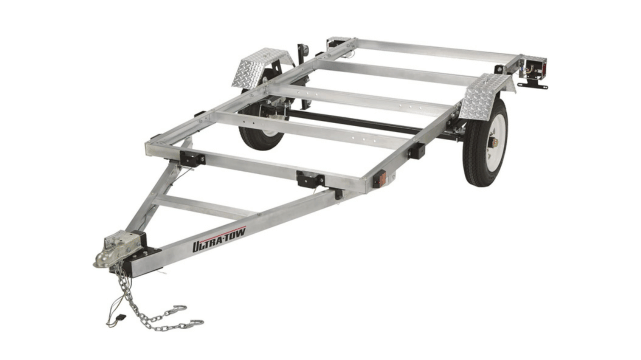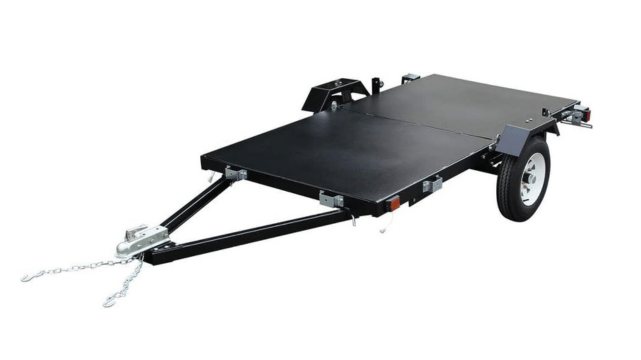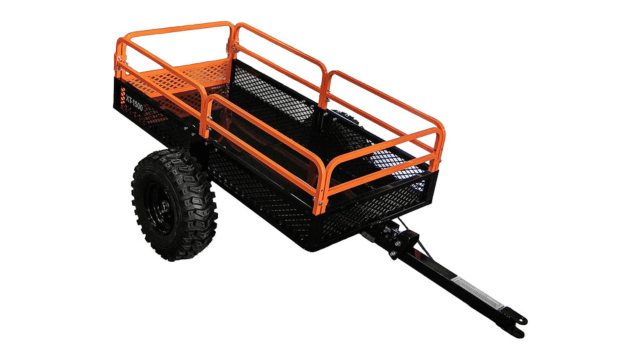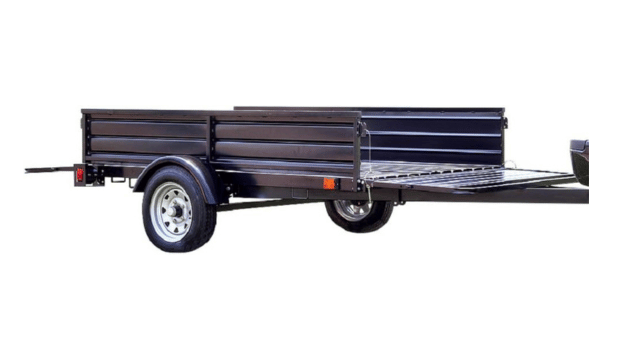Folding trailers have become increasingly popular due to their space-saving design, portability, and versatility. Whether you’re hauling equipment for a DIY project, transporting a motorcycle, or heading out on a camping trip, folding trailers offer a convenient solution for transporting goods without occupying a lot of storage space. The ability to fold and store them when not in use makes these trailers a valuable asset for those with limited garage or yard space.
In this guide, we’ll explore the various types of folding trailers available, key factors to consider when buying one, and tips on choosing the best trailer for your needs. Additionally, we’ll compare materials, discuss essential safety features, and provide insight into proper usage and maintenance.
Best Folding Trailers Buying Guide
When selecting a folding trailer, there are several key factors you need to consider to ensure that the trailer meets your needs. Below are the most important elements that should guide your decision.
Weight Capacity
One of the most critical aspects to consider is the trailer’s weight capacity. This determines how much weight the trailer can safely handle. Folding trailers typically range in capacity from 500 to 3,000 pounds, depending on the model. It’s essential to choose a trailer with a weight capacity that matches your hauling needs. Overloading a trailer can lead to damage or even accidents, so always check the manufacturer’s specifications.
For example, if you’re transporting heavy equipment or multiple ATVs, you’ll need a high-capacity trailer with robust construction. On the other hand, if you’re only carrying light items like camping gear or bicycles, a trailer with a lower weight capacity may suffice.
Trailer Size
The size of the trailer is another crucial factor. Consider the dimensions of the items you’ll be transporting and whether they will fit comfortably on the trailer. Folding trailers come in various sizes, typically ranging from 4 to 8 feet in length and 3 to 6 feet in width. If you plan to haul bulky items or need more versatility, opt for a larger trailer.
Additionally, consider the trailer’s size when folded. The whole point of a folding trailer is space efficiency, so ensure that it folds down to a size that can be easily stored in your garage or shed.
Foldability & Storage
The ease of folding and storing your trailer is an essential factor, especially if you plan to use it frequently. Some folding trailers come with simple mechanisms that allow for quick folding and unfolding, while others may require more effort. Look for a trailer with user-friendly foldability features that make the process smooth and efficient.
Once folded, the trailer should be compact enough for easy storage. Measure the space you have available for storage before purchasing to ensure the trailer will fit when not in use.
Materials & Durability
Folding trailers are typically constructed from aluminum, steel, or a combination of both. Each material has its advantages and disadvantages.
- Aluminum Trailers: Lightweight and corrosion-resistant, making them ideal for those who need to transport lighter loads or live in areas with harsh weather conditions.
- Steel Trailers: Heavier but more durable, steel trailers are perfect for carrying heavier loads. However, steel can rust over time if not properly maintained.
- Hybrid Trailers: Some folding trailers use a combination of aluminum and steel to balance strength and weight.
Weight of the Trailer
In addition to considering the weight capacity, it’s important to think about the weight of the trailer itself. Lighter trailers are easier to tow and fold, but they may lack the durability and load-bearing capacity of heavier models. Heavier trailers, while more robust, may be more challenging to handle and store. Consider how often you’ll need to move and fold the trailer, and choose a weight that aligns with your physical capabilities and towing vehicle.
Towing Vehicle Compatibility
Before purchasing a folding trailer, ensure that it is compatible with your towing vehicle. Check the towing capacity of your car, truck, or SUV to ensure it can safely handle the trailer and its cargo. The trailer should also have the correct hitch size for your vehicle.
Budget Considerations
Folding trailers come in a wide range of prices, from budget-friendly models under $500 to more expensive options that can cost over $2,000. Determine your budget based on your needs and how frequently you plan to use the trailer. While it may be tempting to opt for a cheaper model, investing in a high-quality trailer can save you money in the long run by offering better durability and fewer repairs.
Types of Folding Trailers
There are several types of folding trailers available, each designed for specific uses. Below, we’ll explore the most common types of folding trailers and their features.
Utility Folding Trailers
Utility trailers are among the most versatile options, capable of transporting various types of equipment, tools, and goods. These trailers typically feature a flatbed design with foldable sides for easy loading and unloading. Whether you’re moving lawn equipment, furniture, or building materials, a utility trailer offers great flexibility.
These trailers often come with removable side panels and tailgates, allowing you to convert the trailer into a flatbed for bulkier items. They are ideal for homeowners and DIY enthusiasts who need a reliable way to haul items without investing in a full-size trailer.
Camping Folding Trailers
Designed for outdoor enthusiasts, camping folding trailers are lightweight and easy to tow, making them ideal for transporting camping gear. Many camping trailers come with added features like waterproof covers, tie-down points, and storage compartments for tents, coolers, and other equipment.
Some models are specifically designed to be towed behind small vehicles, such as cars or SUVs, making them an excellent choice for weekend getaways and adventures.
Boat Folding Trailers
Boat trailers are built specifically for towing small watercraft like kayaks, dinghies, or personal boats. These trailers often feature adjustable supports to accommodate different boat sizes and shapes. They are lightweight and foldable for easy storage, making them perfect for water sports enthusiasts who want a convenient way to transport their boats to and from the water.
Motorcycle Folding Trailers
Motorcycle folding trailers are designed to securely transport motorcycles. These trailers usually feature ramps for easy loading and unloading, along with tie-down points to keep the bike stable during transit. Motorcyclists who attend races or enjoy long-distance trips will find these trailers particularly useful.
Motorcycle folding trailers often have a narrow profile, which makes them easy to store when not in use. They can also be folded into compact sizes, perfect for garages with limited space.
Enclosed Folding Trailers
Enclosed folding trailers provide extra protection for the items being transported. These trailers come with walls and a roof to shield cargo from weather conditions like rain, snow, and wind. Enclosed trailers are ideal for transporting sensitive items such as electronics, furniture, or expensive equipment.
They are also popular among businesses that need to transport goods securely, as the enclosed design helps prevent theft or damage.
Flatbed Folding Trailers
Flatbed folding trailers offer a versatile, open design that makes them suitable for hauling larger, bulkier items that may not fit in a traditional trailer. These trailers often have foldable sides or no sides at all, allowing for easy access and loading from multiple angles.
Flatbed trailers are ideal for transporting large pieces of equipment, furniture, or building materials. When folded, they are relatively compact and easy to store.
Material Comparison: Aluminum vs. Steel Trailers
When choosing a folding trailer, one of the key decisions you’ll need to make is whether to opt for an aluminum or steel model. Both materials have their strengths and weaknesses, and the right choice will depend on your specific needs.
Aluminum Folding Trailers
Aluminum trailers are known for their lightweight construction and corrosion resistance. These trailers are easy to tow, even with smaller vehicles, and are less prone to rusting in wet or humid conditions. Aluminum is an excellent choice for those who live in coastal areas or regions with frequent rain or snow.
However, aluminum trailers may not be as durable as steel trailers when it comes to carrying extremely heavy loads. While aluminum is strong, it may not hold up as well under the strain of heavier cargo over long periods.
Steel Folding Trailers
Steel trailers are heavier and more durable than aluminum models. They can handle higher loads, making them ideal for those who need to transport heavy equipment or large quantities of materials. Steel trailers are robust and can withstand rough terrain or long-distance towing.
The downside to steel trailers is that they are susceptible to rust if not properly maintained. Regular cleaning and rust prevention are necessary to extend the lifespan of a steel trailer. Additionally, steel trailers are heavier, which may require a more powerful vehicle for towing.
Hybrid Models
Some folding trailers combine the best of both worlds by using aluminum for certain parts (such as the frame) and steel for others (such as the cargo bed). These hybrid models offer a balance of durability and weight savings, making them an excellent option for those who want a versatile trailer.
Foldability and Portability Features
The ease with which a folding trailer can be folded and transported is one of its main selling points. Here are some of the most important features to consider when evaluating the foldability and portability of a trailer.
Ease of Folding
Some folding trailers feature a simple, one-step folding mechanism that allows you to fold the trailer quickly and efficiently. Others may require more effort, with multiple steps or tools needed to fold the trailer.
Choose a trailer with a user-friendly folding system that won’t take up too much of your time or energy. If you plan to use the trailer frequently, look for models that fold in just a few steps.
Storage Convenience
The primary advantage of a folding trailer is its ability to be stored in a compact space. Consider where you will store the trailer when not in use and make sure it folds down to a size that will fit in your available storage space.
Some folding trailers can be stored upright against a wall, while others may need to be stored horizontally. Measure your storage area before making a purchase to ensure the trailer will fit.
Portability and Wheels
The portability of a folding trailer is another key consideration. Look for trailers with high-quality wheels that can be easily maneuvered when the trailer is folded. Some trailers feature built-in casters that make it easy to move the trailer around your garage or yard when it’s not attached to a vehicle.
Safety Features to Look For
Safety should always be a top priority when selecting a folding trailer. Here are some of the most important safety features to keep in mind.
Brakes
Some folding trailers come equipped with brakes, especially those designed to carry heavier loads. If you’re transporting large or heavy items, brakes can significantly improve your safety on the road by helping you stop more efficiently.
There are two main types of trailer brakes: electric and surge. Electric brakes are controlled by a brake controller inside the towing vehicle, while surge brakes are activated by the trailer’s momentum.
Lights
Trailer lights are crucial for ensuring your visibility on the road, especially at night or in low-light conditions. Most folding trailers come with built-in tail lights and brake lights, but it’s important to verify that the lights are functioning correctly before each trip.
Make sure the trailer is equipped with the necessary lighting to comply with local regulations. This typically includes tail lights, brake lights, and turn signals.
Safety Chains and Tie-Downs
Safety chains and tie-down points are essential for securing your cargo and ensuring the trailer stays attached to the towing vehicle. Safety chains act as a backup connection in case the hitch fails, while tie-down points allow you to secure your cargo to prevent it from shifting during transit.
Ensure that the trailer has robust safety chains and plenty of tie-down points to keep your cargo safe.
Hitch Compatibility
Before purchasing a folding trailer, make sure it is compatible with your vehicle’s hitch. Most trailers are designed to work with standard hitch sizes, but it’s always a good idea to double-check. A secure connection between the trailer and the towing vehicle is crucial for safe towing.
Trailer Accessories to Enhance Your Experience
Investing in the right accessories can make using your folding trailer more convenient and efficient. Here are some popular accessories to consider.
Trailer Ramps
Ramps make it easier to load and unload heavy items, such as motorcycles or lawn equipment, onto the trailer. Some trailers come with built-in ramps, while others require you to purchase them separately.
Look for ramps that are easy to store and attach securely to the trailer when in use.
Trailer Covers
A trailer cover can protect your folding trailer from the elements when it’s not in use. Covers are particularly useful for aluminum trailers, as they help prevent water damage and rust.
Choose a cover made from durable, waterproof material that fits snugly over your trailer.
Spare Tire
Having a spare tire for your trailer is essential in case of a flat during transit. Many trailers come with a spare tire mount, but if yours doesn’t, you can purchase one separately.
Make sure the spare tire is the correct size for your trailer and keep it properly inflated at all times.
Tie-Down Straps
Tie-down straps are essential for securing cargo to your trailer. Look for heavy-duty, adjustable straps that can handle the weight of your items without stretching or breaking.
Some trailers come with built-in tie-down points, but if not, you can install aftermarket tie-down hooks or loops.
Frequently Asked Questions (FAQs)
Q: What is the advantage of a folding trailer over a traditional trailer?
A: Folding trailers offer the advantage of compact storage, making them ideal for those with limited space. They are also lightweight, easy to tow, and versatile for various uses. When not in use, they can be folded down and stored in a garage or shed, unlike traditional trailers that require more space.
Q: How much weight can a folding trailer carry?
A: Folding trailers come in a range of weight capacities, from as low as 500 pounds to as high as 3,000 pounds or more. The weight capacity will depend on the specific model you choose. It’s important to select a trailer with a weight capacity that meets your hauling needs.
Q: Can I tow a folding trailer with a small vehicle?
A: Yes, many folding trailers are designed to be lightweight and easy to tow with smaller vehicles, such as cars and SUVs. However, it’s essential to check the towing capacity of your vehicle and make sure it is compatible with the trailer you plan to purchase.
Q: Do folding trailers require maintenance?
A: Like any trailer, folding trailers require regular maintenance to ensure they stay in good working condition. This includes checking the tires, lubricating moving parts, inspecting the lights, and cleaning the trailer to prevent rust and corrosion.
Q: Are folding trailers safe to use on highways?
A: Yes, folding trailers are designed for use on highways, as long as they are properly loaded and secured. It’s essential to follow all safety guidelines, such as using safety chains, securing your cargo with tie-downs, and ensuring the trailer lights are functioning correctly.
Final Verdict
Folding trailers offer a convenient and space-saving solution for hauling various types of cargo. Whether you need a utility trailer for DIY projects, a camping trailer for outdoor adventures, or a motorcycle trailer for your bike, there is a folding trailer to meet your needs.
When choosing the best folding trailer, consider factors such as weight capacity, size, materials, and safety features. By selecting a trailer that aligns with your requirements, you’ll enjoy the convenience and versatility that a folding trailer offers for years to come.





